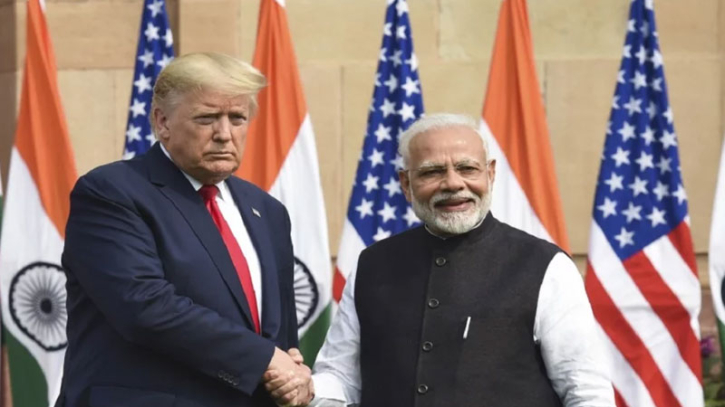The Trump administration's foreign policy and Bangladesh

It is not a secret that the Awami League had been waiting in hopes that Donald Trump would win the US Presidential elections in November 2024. Their idea seems to have originated from the first Trump presidency.
During Trump 1.0, there were several factors which led AL to formulate its opinions that this was the administration which would facilitate it no matter how deplorable its human rights record, corruption and record of vote rigging were.
First, in his first term, Trump had demonstrated interest in Bangladesh only when, in 2019, the organizing secretary of the Bangladesh Hindu Christian Unity Council named Priya Saha told him at a much-publicized meeting in the Oval Office that Hindus are in danger in Bangladesh and that her village home was burned by Muslim fundamentalists. She was eventually suspended by the organization, but the stage was set for proponents of the false narrative of minorities being unsafe in Bangladesh. To this day, that false narrative is advocated energetically by the Indian media and government.
Second, Trump’s friendship with Indian Prime minister Modi solidified Sheikh Hasina’s, her party’s and the Indian quarters’ conviction that the Trump administration, seemingly being such a big fan of the India administration, was naturally also an equally big fan of Sheikh Hasina and her party, no matter how egregious their crimes.
Fast forward to 2025 and President Trump’s second administration. Sheikh Hasina has been disgracefully ousted by the student revolution in Bangladesh, being sheltered naturally by India. The Indian media and government continue with their daily futile plots to attempt destabilizing the interim government of Bangladesh led by Dr. Muhammad Yunus, whom Sheikh Hasina views as her archenemy. The hopes and dreams that President Trump is back and therefore will fully facilitate Hasina’s return to re-establish her dictatorial rule over Bangladesh were also back in the Hasina camp.
Modi’s visit to the US in February
During a press conference when Indian PM Modi visited the White House last week, one of the questions directed towards President Trump was regarding any “deep state involvement” with regards to the change of government in Bangladesh. To this, Trump replied: “Well, there was no role for our deep state” and that he would leave “Bangladesh to the prime minister.”
There has been endless speculation about Trump’s comments. In Bangladesh, it has caused apprehension about the US once again viewing the country from the lens of India as was the case during the Obama administration, which viewed this to be the best policy to “counter China.” In India, the glee could be surmised from its infamous media that Trump “gave Bangladesh to Modi.”
The Indian media’s spin ignored the subtleties of these comments. First, Trump specified that there was no role of the deep state in his administration. Second, he handed the question of Bangladesh, not the country of Bangladesh, over to Modi.
The facts about the Trump 2.0 administration’s foreign policy
President Trump had once again run on an “America First” policy, with a focus on establishing peace in conflict regions and an eventual disengagement from conflicts to focusing on domestic policies.
To examine how realistic those goals are, we must look at some specific examples:
First, we have witnessed this week US-Russian dialogue for the first time in three years in Saudi Arabia.
Second, Secretary of State Marco Rubio has explicitly laid out this administration’s foreign policy agenda in an extensive interview stating that military and political confrontation will be avoided at all costs, with dialogue and negotiations taking precedence, particularly with the other major global powers, notably Russia and China.
Third, President Trump has declared that he wants to cut the US’s exorbitant defense budget and to urge China and Russia to do the same. He has also expressed his desire to begin denuclearization talks with these countries.
What about Bangladesh?
The Trump administration’s policy to not antagonize China militarily and to foster healthy diplomatic relations indicates that the previous policies of “containing China,” prioritizing India’s role in the Asia Pacific region and lumping in Bangladesh as a part of India in that endeavour does not therefore seem likely.
However, this does not indicate that Bangladesh will be completely out of the woods because the main actors eternally conniving to destabilize it (and we all know who they are), will not abandon their nefarious efforts. The dangers lie in the extreme right wing Hindu nationalist party and its parent organization, the RSS’s extremely close-knit relationship with the Trump administration’s new Director of National Security, Tulsi Gabbard.
It is possible that false flag operations in Bangladesh under the guise of harming minorities, particularly Hindus, may occur on larger scales. It is no secret that the agenda from across Bangladesh’s border has been to cause political instability and social unrest through communal riots, while placing the blame on the fabricated “Islamic fundamentalism.” It can only be hoped that the US National Security does not get manipulated by Bangladesh’s neighbour into a fabricated “fight against terrorism,” in desperate attempts to reinstall the neighbour’s puppet regime in Bangladesh.
Of course, this is not at all as easy as it sounds. The July Revolution of 2024 in which a dictatorship was ousted is testament to how resilient Bangladeshis are and how they value democracy and national sovereignty.
Having said that, to quote the Soviet Premier from the Cold War Nikhita Khruschev: “If you live among wolves, you have to act like a wolf.”
Vigilance, for Bangladesh 2.0, is key.
Writer: Sabria Chowdhury Balland is a US-based academic, author, editor and the President & Founding Member of the nonprofit The Coalition for Human Rights & Democracy (CHRD). She can be reached at [email protected] & X handle @sabriaballand.
.png)




